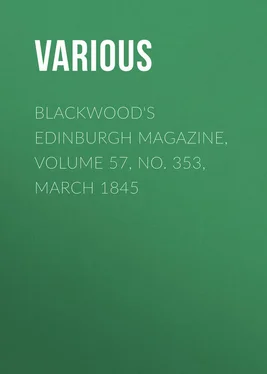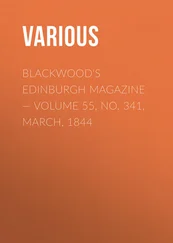Various - Blackwood's Edinburgh Magazine, Volume 57, No. 353, March 1845
Здесь есть возможность читать онлайн «Various - Blackwood's Edinburgh Magazine, Volume 57, No. 353, March 1845» — ознакомительный отрывок электронной книги совершенно бесплатно, а после прочтения отрывка купить полную версию. В некоторых случаях можно слушать аудио, скачать через торрент в формате fb2 и присутствует краткое содержание. Издательство: Иностранный паблик, Жанр: periodic, foreign_edu, Путешествия и география, на английском языке. Описание произведения, (предисловие) а так же отзывы посетителей доступны на портале библиотеки ЛибКат.
- Название:Blackwood's Edinburgh Magazine, Volume 57, No. 353, March 1845
- Автор:
- Издательство:Иностранный паблик
- Жанр:
- Год:неизвестен
- ISBN:нет данных
- Рейтинг книги:5 / 5. Голосов: 1
-
Избранное:Добавить в избранное
- Отзывы:
-
Ваша оценка:
- 100
- 1
- 2
- 3
- 4
- 5
Blackwood's Edinburgh Magazine, Volume 57, No. 353, March 1845: краткое содержание, описание и аннотация
Предлагаем к чтению аннотацию, описание, краткое содержание или предисловие (зависит от того, что написал сам автор книги «Blackwood's Edinburgh Magazine, Volume 57, No. 353, March 1845»). Если вы не нашли необходимую информацию о книге — напишите в комментариях, мы постараемся отыскать её.
Blackwood's Edinburgh Magazine, Volume 57, No. 353, March 1845 — читать онлайн ознакомительный отрывок
Ниже представлен текст книги, разбитый по страницам. Система сохранения места последней прочитанной страницы, позволяет с удобством читать онлайн бесплатно книгу «Blackwood's Edinburgh Magazine, Volume 57, No. 353, March 1845», без необходимости каждый раз заново искать на чём Вы остановились. Поставьте закладку, и сможете в любой момент перейти на страницу, на которой закончили чтение.
Интервал:
Закладка:
I point so often to the feelings, the ideas, or the ceremonies of religion, because there never yet was profound grief nor profound philosophy which did not inosculate at many points with profound religion. But I request the reader to understand, that of all things I was not, and could not have been, a child trained to talk of religion, least of all to talk of it controversially or polemically. Dreadful is the picture, which in books we sometimes find, of children discussing the doctrines of Christianity, and even teaching their seniors the boundaries and distinctions between doctrine and doctrine. And it has often struck me with amazement, that the two things which God made most beautiful among his works, viz. infancy and pure religion, should, by the folly of man, (in yoking them together on erroneous principles,) neutralize each other's beauty, or even form a combination positively hateful The religion becomes nonsense, and the child becomes a hypocrite. The religion is transfigured into cant, and the innocent child into a dissembling liar. 12 12 I except, however, one case – the case of a child dying of an organic disorder, so therefore as to die slowly, and aware of its own condition. Because such a child is solemnized, and sometimes, in a partial sense, inspired – inspired by the depth of its sufferings, and by the awfulness of its prospect. Such a child having put off the earthly mind in many things, may naturally have put off the childish mind in all things. I therefore, speaking for myself only, acknowledge to have read with emotion a record of a little girl, who, knowing herself for months to be amongst the elect of death, became anxious even to sickness of heart for what she called the conversion of her father. Her filial duty and reverence had been swallowed up in filial love.
God, be assured, takes care for the religion of children wheresoever his Christianity exists. Wheresoever there is a national church established, to which a child sees his friends resorting; wheresoever he beholds all whom he honours periodically prostrate before those illimitable heavens which fill to overflowing his young adoring heart; wheresoever he sees the sleep of death falling at intervals upon men and women whom he knows, depth as confounding to the plummet of his mind as those heavens ascend beyond his power to pursue — there take you no thought for the religion of a child, any more than for the lilies how they shall be arrayed, or for the ravens how they shall feed their young.
God speaks to children also in dreams, and by the oracles that lurk in darkness. But in solitude, above all things, when made vocal by the truths and services of a national church, God holds "communion undisturbed" with children. Solitude, though silent as light, is, like light, the mightiest of agencies; for solitude is essential to man. All men come into this world alone – all leave it alone . Even a little child has a dread, whispering consciousness, that if he should be summoned to travel into God's presence, no gentle nurse will be allowed to lead him by the hand, nor mother to carry him in her arms, nor little sister to share his trepidations. King and priest, warrior and maiden, philosopher and child, all must walk those mighty galleries alone. The solitude, therefore, which in this world appals or fascinates a child's heart, is but the echo of a far deeper solitude through which already he has passed, and of another solitude deeper still, through which he has to pass: reflex of one solitude – prefiguration of another.
Oh, burthen of solitude, that cleavest to man through every stage of his being – in his birth, which has been – in his life, which is – in his death, which shall be – mighty and essential solitude! that wast, and art, and art to be; – thou broodest, like the spirit of God moving upon the surface of the deeps, over every heart that sleeps in the nurseries of Christendom. Like the vast laboratory of the air, which, seeming to be nothing, or less than the shadow of a shade, hides within itself the principles of all things, solitude for a child is the Agrippa's mirror of the unseen universe. Deep is the solitude in life of millions upon millions who, with hearts welling forth love, have none to love them. Deep is the solitude of those who, with secret griefs, have none to pity them. Deep is the solitude of those who, fighting with doubts or darkness, have none to counsel them. But deeper than the deepest of these solitudes is that which broods over childhood, bringing before it at intervals the final solitude which watches for it, and is waiting for it within the gates of death. Reader, I tell you a truth, and hereafter I will convince you of this truth, that for a Grecian child solitude was nothing, but for a Christian child it has become the power of God and the mystery of God. Oh, mighty and essential solitude, that wast, and art, and art to be – thou, kindling under the torch of Christian revelations, art now transfigured for ever, and hast passed from a blank negation into a secret hieroglyphic from God, shadowing in the hearts of infancy the very dimmest of his truths!
MRS POOLE'S "ENGLISHWOMAN IN EGYPT." 13 13 The Englishwoman in Egypt. – Letters from Cairo, written during a residence in 1842, 1843, and 1844, with E. W. Lane, Esq., author of the Modern Egyptians . By his Sister.
An "Englishwoman in Egypt," thanks to the Mediterranean steamers and the overland route to India, is no longer so unusual or astounding a spectacle as it would appear to have been five-and-twenty years ago, when that dilettante traveller, Monsieur le Comte de Forbin, made a precipitate retreat from Thebes in consequence of the shock sustained by his nerves, from encountering among the ruins "une femme-de-chambre Anglaise, en petit spencer couleur de rose," in the person of the Countess of Belmore's lady's-maid; though the Quarterly Reviewers, who in those days had no mercy for a French misstatement, even in the colour of a soubrette's dress, triumphantly declared the offending garment to have been "a pale-blue pelisse;" and proceeded to demolish the hapless Count accordingly – ( Quarterly Review , Vol. xxiii. p. 92.) Since the period of this rencontre, the ill-omened blue eyes, 14 14 Blue eyes are regarded in the East as so unlucky, that the epithet "blue-eyed" is commonly applied as a term of abuse – (see Lane's Thousand and One Nights , chap. XV. note 9.) We find from Miss Pardoe, that a similar prejudice prevails among the Osmanlis.
as well as blue pelisses, of our countrywomen, have been seen with sufficient frequency on the banks of the Nile to render the one, it is to be hoped, no longer an object of alarm to the natives, nor the latter to errant members of the Institute: but a narrative of the impressions produced on a cultivated female mind by a residence among the modern inhabitants of the land of the pyramids, was still a desideratum. The "Notes" (published in 1840 in the Asiatic Journal ) of the late lamented Emma Roberts, than whom no one would have been better qualified to fill up the void, though replete with interest and information, are merely those of a traveller hastening through the country on her way to India; and, except the fugitive sketches of Mrs Dawson Damer, we cannot call to mind a single one among all the lady-tourists, with whose tours and voyages the press has lately teemed, who has touched on this hitherto unbroken ground. In such a dearth of information, we may deem ourselves doubly fortunate in finding the task undertaken by a lady possessing such peculiar advantages as must have been enjoyed by the sister of the well-known Orientalist, to whose pen we are indebted for perhaps the most comprehensive and accurate account ever published of the habits and manners of any nation, and under whose immediate superintendence, as we are informed, the work before us was prepared.
Интервал:
Закладка:
Похожие книги на «Blackwood's Edinburgh Magazine, Volume 57, No. 353, March 1845»
Представляем Вашему вниманию похожие книги на «Blackwood's Edinburgh Magazine, Volume 57, No. 353, March 1845» списком для выбора. Мы отобрали схожую по названию и смыслу литературу в надежде предоставить читателям больше вариантов отыскать новые, интересные, ещё непрочитанные произведения.
Обсуждение, отзывы о книге «Blackwood's Edinburgh Magazine, Volume 57, No. 353, March 1845» и просто собственные мнения читателей. Оставьте ваши комментарии, напишите, что Вы думаете о произведении, его смысле или главных героях. Укажите что конкретно понравилось, а что нет, и почему Вы так считаете.












